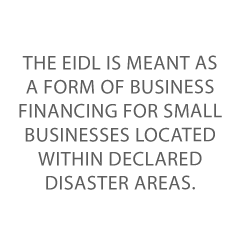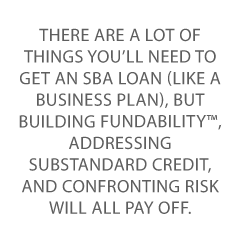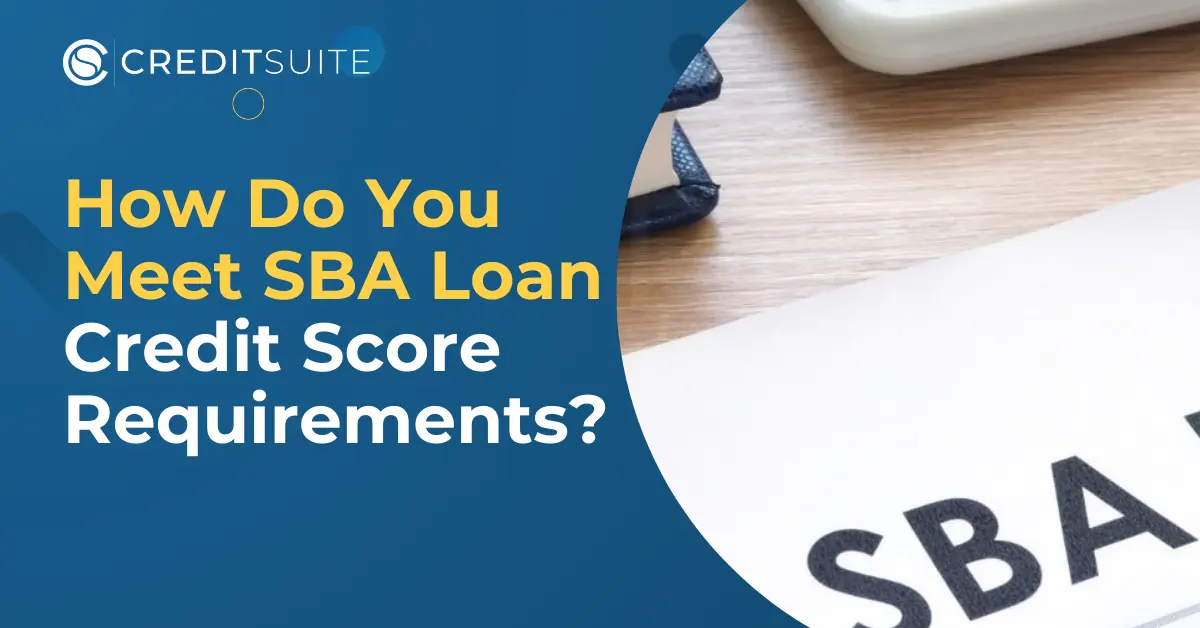What are basic SBA loan credit score requirements? Can we mere mortals ever hope to qualify for a Small Business Administration loan?
SBA loans are highly coveted by small business owners, and for good reason, as the interest rates are good and the loan amount can be high.
But can anybody actually get them?
Credit Score Requirement by SBA Loan Type:
As you may expect, there are different requirements depending on which SBA loan you’re going for. In addition, these varying SBA lending products are intended to meet different needs of small businesses.
Also, any given SBA lender may have their own individual requirements. These requirements can cover a personal credit score in addition to a small business credit score.
As a result, if you are unable to meet a minimal credit score for one type of SBA loan, you may be able to qualify for a different type of small business loan from the SBA.
SBA 7a Requirements
For the 7(a), the SBA’s most popular loan program, the minimum credit score isn’t under personal credit at all—it’s the FICO SBSS. The SBA is looking for a 155 at minimum for loans of up to $350,000.
SBSS (Small Business Scoring System) calculates a small business owner’s credit reporting agency data, financials, and other factors to produce a number between 0 and 300.
Factors in scoring include personal and business credit score, liens and judgments, cash flow and revenue, assets and liabilities, and time in business.
But SBSS scores can change as an adjustment to market and credit conditions.
Because a business can get a 7a loan for up to $5 million, operate under the assumption that the minimum credit score would be higher for a significantly higher amount.
You can use a 7a loan for various business expenses, such as working capital, inventory, fixed assets, and purchasing real estate.
SBA 504 Requirements
The SBA 504 loan is a somewhat different type of loan in that it is comprised of your 10% down payment, 40% from a Certified Development Company, and the remaining 50% from the lender.
A small business’s cash flow will make the biggest difference in terms of whether a company can get such a loan—and FICO score will not loom quite as large. Still, a 680 or better minimum credit score will always bolster an SBA loan application.
The SBA will take an interest in your projected cash flow. If it does not appear to be substantial enough to pay back the loan, the loan application will possibly be denied.
The 504 is specifically intended for assets to promote job growth and creation. Suggested uses tend to be for the purchase or improvement or modernization of bigger ticket items like land, buildings, and equipment.
However, you cannot use a 504 loan for working capital or inventory; consolidating, repaying, or financing debt; or speculating or investing in rental real estate.
SBA Express Loan Requirements
Requirements for SBA Express lending are to fit the SBA’s definition of a small business. Your business must be operated for profit and within the United States or its territories.
Like with most forms of SBA lending, you will need to have a reasonable amount of owner equity to invest. Also, an owner must have already placed financial resources, such as personal assets, toward the business.
You will also have to meet the lender’s requirements, if they are above and beyond those demanded by the SBA. Often, this can mean a minimum credit score of 650 and strong, provable annual revenue.
In general, you will need to be in business for two or more years, so this is not a good financing option for a brand-new startup. But a later stage startup has a chance for loan approval.
Collateral may be required if you are borrowing more than $25,000.
SBA Economic Injury Disaster Loan Requirements
For an SBA disaster loan, the minimum credit score requirement is lower than for most such funding, but still in the high 500s.  The EIDL is meant as a form of business financing for small businesses located within declared disaster areas.
The EIDL is meant as a form of business financing for small businesses located within declared disaster areas.
You can get up to $2 million and use it for regular expenses or for working capital. This is everything from making payroll to rent.
It is possible to also qualify for physical damage loans from the SBA (which is also for up to $2 million) if your business suffered physical damage due to the declared disaster.
If you get a loan for physical damage, you can use the SBA loan proceeds to repair damaged property. This can be buildings, equipment, or inventory. Payment terms are for up to 30 years. The interest rate is capped at 8%.
Keep in mind that this SBA loan program is for declared disaster areas.
SBA Microloan Requirements
With microloans, there can be a great deal of variation by lender. Since they aren’t for a lot of money, you can most likely have a lower business credit score or personal credit score and less time in business, yet still qualify.
Often, you will need to combine a microloan with other forms of business credit or the like to have enough business financing for your purposes.
Still, they are a good way to get an SBA loan for financing for a small business when other means of funding are not available to your business. Combine it with a small business credit card for more purchasing power.
And, when you pay off small business credit cards on time, that will help to enhance your small business credit report.
Microloans tend to be better when you cannot get a traditional business loan due to bad credit. Or, you just plain don’t need a lot of money.
SBA Export Loan Requirements
Export loans are one of the many SBA loan options which are for a very specific purpose, like their disaster lending. Straying from that purpose can mean ending up in court for SBA loan fraud.
So, you will need to be careful and apply this funding choice properly.
Currently the maximum amount is $500,000. Interest rates can range from Prime + 4.5% up to Prime + 6.5%. This depends upon the loan amount. There are terms of up to seven years if used as a line of credit, or up to 25 years if used as a term loan.
There is also an Export Working Capital loan. This is financing of up to $5 million to export companies. You can use it for working capital, inventory, producing export goods or services, and more. The loan must be repaid after one year if you use it as a line of credit.
Non-Credit SBA Loan Qualifications
How to Build Credit to Qualify for More Lending Options
We talk a lot about building business credit here at Credit Suite, and the reason is not just because it helps you get financing from a bank or an alternative lender like Funding Circle or anyone else. We also talk about it because it is a form of financing unto itself.
But let’s look at it in the context of SBA financing specifically (as opposed to getting, say, a merchant cash advance or a PPP loan) and in terms of meeting SBA loan requirements.
When the goal is to get any type of business loan, then you need to think like a lender. A lender wants a business loan to be paid back. They want assurances. Otherwise, the lender will not approve the business loan.
These assurances come from building what is called Fundability™.
Building a Fundability Foundation™
A lender wants to know that a business loan is going to a legitimate company and not just your pocket. Building Fundability™ means a separate business bank account, address, phone number, and email address. It means a professional business website as well.
These kinds of investments of time and money into your business show a lender that you are serious about things, and a business loan will be spent on an actual company and not just some shell.
Building Fundability™ to get a business loan also means getting an EIN from the IRS. Showing a lender that you are willing to prepare a separate tax return also shows you quite literally mean business.
You can also assure a small business loan provider by getting all licenses your industry, the state, city, and perhaps county all require.
Head Bad Credit Off at the Pass
Bad credit history on the personal side makes lenders nervous about giving out a small business loan. But a history of paying off each personal or company credit card will pay dividends here, and raise your personal and/or corporate credit scores.
Risk and Industry
Some industries are just plain risky, no matter how you slice them. Trucking, for example, can always lead to accidents, no matter how experienced and careful a driver is. This is when working with a lender familiar with your industry really pays off.
Specialty lenders may provide SBA loans, so do your research. They are out there!
FAQs
What is the Minimum Credit Score for an SBA Loan?
This depends on the business loan itself. Disaster loans have lower credit score requirements because a declared disaster area already proves need and purpose—and can serve as an explanation if an owner’s FICO score isn’t the greatest.
The requirements for a 7(a) or a 504 tend to be the strictest. You will need collateral for larger amounts.
SBA lenders also look at more than your credit history. A small business with good cash flow and revenue is going to be very attractive to a lender, thereby making it a lot more likely that a business can get this form of financing.
Are SBA Loans Based on Credit Score?
They often can be, although cash flow can play a large part. Plus, the SBA will want you to have invested equity and, often, be able to put up collateral for larger lending amounts.
The idea behind this form of financing is that it is intended to give small businesses more opportunities to get financing. But at the same time, the SBA is not going to underwrite junk loans which it is not optimistic about profiting on.
When all is said and done, a good business credit score and/or a good personal credit history will go a long way toward getting an approval for SBA loans.
But if your small business is raking in a million dollars a month, the SBA will weigh that a lot more heavily than your scores.
Which Credit Score Does the SBA Look at?
Often, these are going to be standard personal credit score such as you see from FICO, which run from 300 to 850, with a higher number being better.
However, for the 7(a) loan, the SBA will be looking at your company’s FICO SBSS. The SBA wants to see a 155 at minimum for loans of up to $350,000.
The SBSS (Small Business Scoring System) calculates an owner’s credit bureau data, financials, and other factors. This is all to generate a rather different number, which runs between 0 and 300.
For microloans, this will depend on the lending institution. And for CAPLines or Export loans, the SBA will look at other factors which go beyond your credit and may even not pay attention to your scores at all.
Takeaways
 There are a lot of things you’ll need to get an SBA loan (like a business plan), but building Fundability™, addressing substandard credit, and confronting risk will all pay off.
There are a lot of things you’ll need to get an SBA loan (like a business plan), but building Fundability™, addressing substandard credit, and confronting risk will all pay off.
Contact us today and we’ll help you delve into what you’ve already mastered and what you need to work on, to get a loan from the SBA. And there’s more.
We can show you other options for financing your small business you may not have thought of, because SBA loans aren’t all that’s out there.

